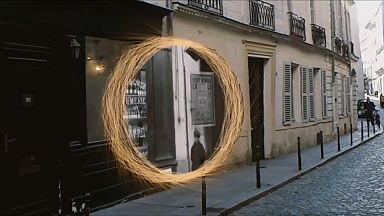A European project seeks to digitally read old documents to help recreate the continent's diverse history
Experts from across Europe have gathered in Dresden to find ways of using the continent's wealth of historical documents to create a picture of the past.
Computer scientists, historians and archivists came to the east German city to discuss Time Machine, a research project that uses artificial intelligence to help us better understand Europe's cultural heritage.
Virtual worlds are at the centre of their plans, similar to a reconstruction of the Notre Dame Cathedral in Paris that visitors can already use.
There are 5,000 years of European history out there — in the form of archeological finds, birth records, church documents or wills — that digital tools and AI can help us exploit.
But researchers say it's a huge undertaking and that the process of digitising them needs to become faster and cheaper.
Thomas Aigner, an archivist, says automating the process of converting medieval documents will be difficult: `"For example, how can we automatically convert complicated manuscripts from the 16th or 17th centuries, or the Middle Ages, into texts that can be further processed?"
The answer, European experts say, is in artificial intelligence.
Julia Noordegraaf, professor of digital heritage at the University of Amsterdam, says the Dutch capital has a 400-year history of wills and documents that describe the contents of people's houses.
"In the past, you would really have to dig and read all these handwritten documents," she says.
"Now the city archives employ handwriting recognition software that automatically transcribes these handwritten notes, and that allows us to draw out all the objects, people and events in those data".
Researchers say they hope the tools will not just help Europeans learn about their past, but also increase their sense of belonging to a diverse but shared history.
Computer scientist Frédéric Kaplan says history is more than just the grand narrative of countries and wars.
"You also have all the other forms of history — the history of your street, the history of your family," he says.
400 institutions have so far signed up to the Time Machine scheme.
It means that virtual time travel possible in small cities like Sion in Switzerland, as well as parts of Amsterdam, Budapest, Paris or Vienna.
"All of these different histories mix up in a ‘Big Data of the Past’ that is able to connect them together, allowing us to reconstruct the complex picture of the past."
Researchers say the interactive data is being designed to help academics and industry.
But locals and tourists will benefit too, helping them to discover and explore. They can even annotate data with notes of their own.
Doorit Raines, a historian at the University of Venice, says it can a perfect service for tourists: they can use the app for research before their journey, and then share their own photographs for others to use afterwards.












